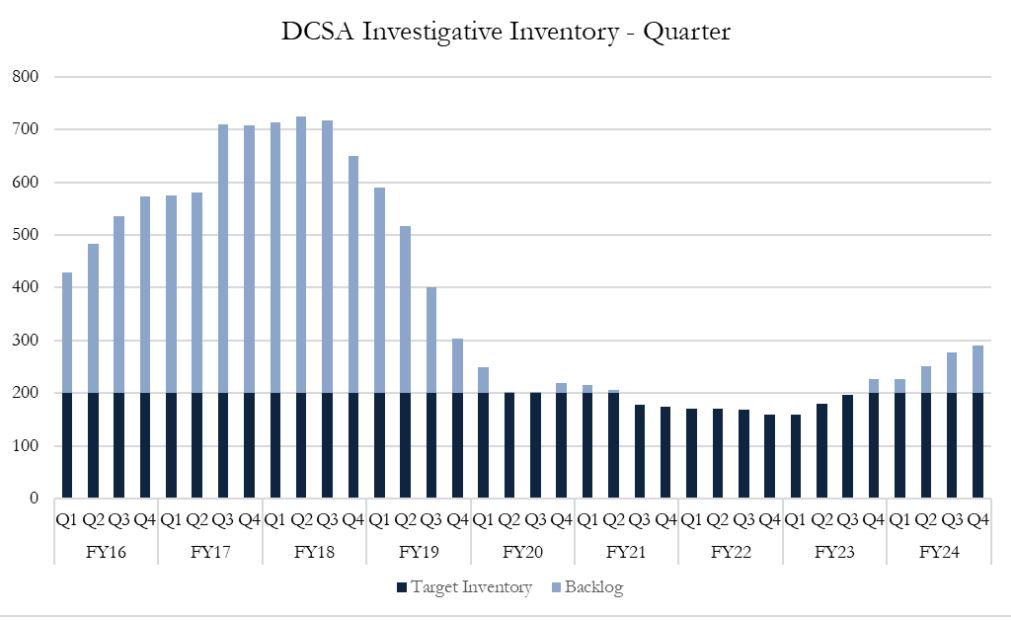DCSA ‘tiger team’ digs into growing background investigations backlog
The background investigations inventory at DCSA has been growing for more than a year. Now officials are trying to address bottlenecks in the process.
A Defense Counterintelligence and Security Agency “tiger team” is moving to address an increase in the backlog of security clearance background investigations.
The growth in backlogged cases corresponds with longer timelines to complete both secret and top-secret clearance investigations. Those delays are a persistent concern for both agencies and industry as they look to fill positions that require clearances.
The backlog has been rising since 2023. DCSA’s investigations inventory sat at just below 300,000 cases at the end of fiscal 2024, according to the latest “Trusted Workforce 2.0” update. That’s the highest it’s been since the fourth quarter of fiscal 2019, when officials were chipping their way out of a massive background investigations backlog.

In the fourth quarter of fiscal 2024, secret-level clearance investigations were completed in 68 days, on-average. The goal is 40 days. Meanwhile, top-secret level investigations took an average 169 days, far from the goal of 80 days.
Mark Pekrul, DCSA’s deputy director of customer and stakeholder engagement, said DCSA Director David Cattler commissioned the tiger team two months ago to address the rising backlog. The team is identifying areas where the investigations process could be streamlined.
“The numbers you see with regard to inventory and case processing timeliness, particularly the background investigation portion, are not where DCSA would like them to be, and we of course understand fully it is not where our industry partners would like that to be, or federal agency partners,” Pekrul said during a Nov. 13 meeting of the National Industrial Security Program Policy Advisory Committee.
The tiger team has identified three major issues so far, Pekrul added. The first challenge is “workload forecast,” he said. Last year, DCSA said an unexpected surge in cases was partially to blame for the rising inventory.
“Working with our federal customers and industry to get a better, more thorough understanding of exactly what workload to expect and anticipate each year,” Pekrul said. “That was part of it.”
The second challenge centers on “workload management” and workload process.”
“Within the personal security directorate here at DCSA, our records processing, our quality review processing, and also certainly at our field locations around the country, to which the investigators report and from which they get their work and go out and conduct the background investigations,” Pekrul said.
The third major challenge identified by the tiger team is “throughput.” Pekrul said DCSA is identifying bottlenecks in the investigations process, such as records processing.
“A large number of cases in the inventory are pending just a final touch, whether that is one final records check, one final review from quality review, something like that,” Pekrul said. “So we want to get at these bottlenecks and see about getting as many of these one or two touch cases that we have processed and out to you and to our other customers as quickly as we can.”
“We anticipate being able to implement some changes and some improvements as early as the end of January or thereabout,” Pekrul added.
DCSA action plan
DCSA is also following up on its designation as a “high impact service provider” by issuing its first-ever HISP action plan.
The White House Office of Management and Budget selects HISPs “due to the scale and critical nature of their public facing services.” DCSA was designated due to its role in conducting 95% of initial background investigations across the federal government.
DCSA’s action plan shows the agency plans to launch surveys in 2025 to identify “pain points” in the clearance application process.
The agency also plans to improve the user experience on its website; enhance educational materials for applicants navigating the background investigation process; and improve the Facility Security Officer toolkit.
During Federal News Network’s CX Exchange earlier this year, Pekrul said DCSA’s designation as a HISP will give the agency a better chance to hear from individuals about a vetting process that can often be frustrating and confusing.
“It’s going to be resources. It’s going to be ideas. It’s going to be opportunities to better measure success, find areas of improvement and implement those,” Pekrul said.
NBIS plan moves forward
Meanwhile, DCSA is also taking steps to get a key IT program, the National Background Investigation Services, back on track. NBIS is central to the Trusted Workforce 2.0 initiative’s goals to overhaul and streamline the federal personnel vetting process. But the program is years behind schedule and hundreds of millions of dollars over budget.
The Pentagon’s head of acquisition and sustainment approved a new acquisition decision memorandum for NBIS in October. That comes after DCSA completed a series of “recovery sprints” to ensure the NBIS program will use “rigorous acquisition planning, apply best practices for modern software acquisition and development, and set measures for cybersecurity compliance,” DCSA wrote in a press release earlier this month.
“These steps position DCSA to launch the migration-and-modernization of NBIS existing capital investments to the cloud and accelerates the retirement of current personnel vetting IT systems,” the agency added.
Copyright © 2024 Federal News Network. All rights reserved. This website is not intended for users located within the European Economic Area.
Follow @jdoubledayWFED






